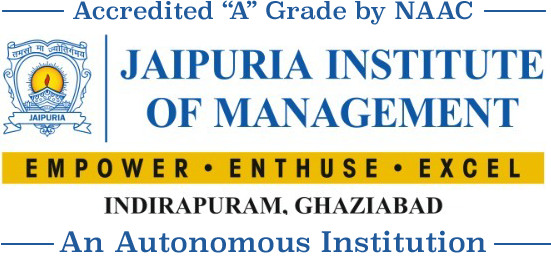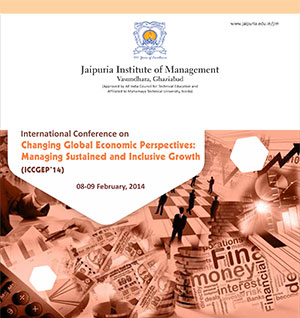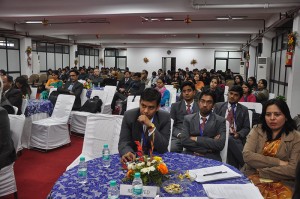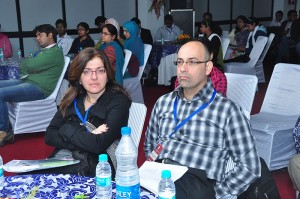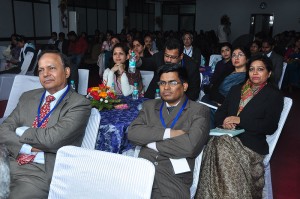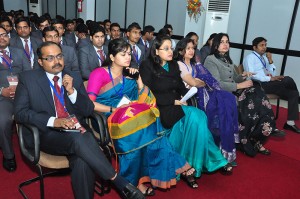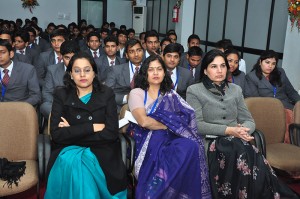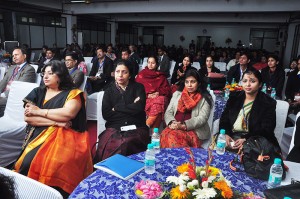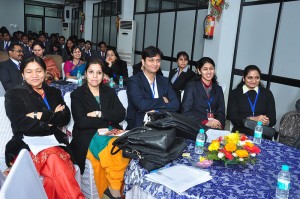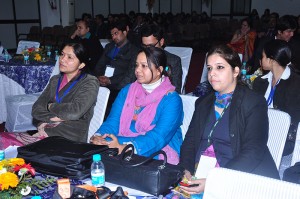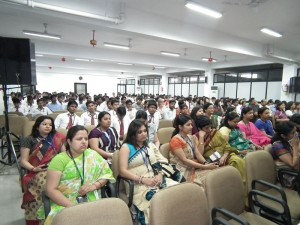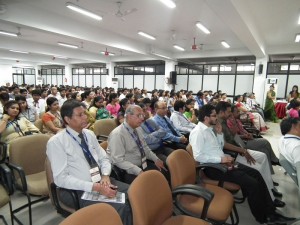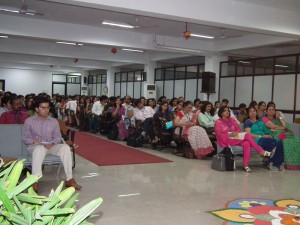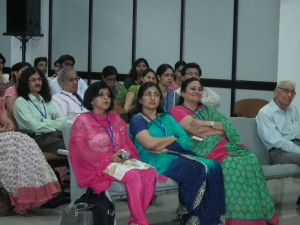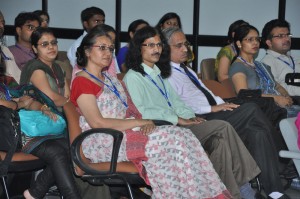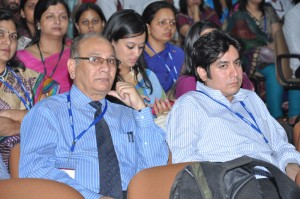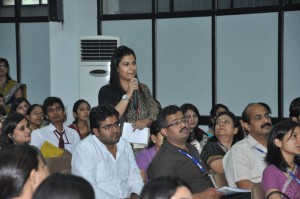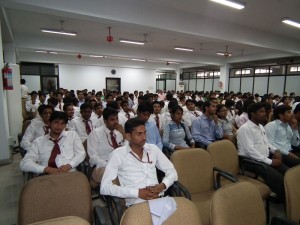INTERNATIONAL CONFERENCE ON
CHANGING GLOBAL ECONOMIC PERSPECTIVES: MANAGING SUSTAINED AND INCLUSIVE GROWTH (ICCGEP’14) 08-09 FEBRUARY, 2014
INTERNATIONAL CONFERENCE EVENT HIGHLIGHTS
On 9th February, 2014 Jaipuria Institute of Management successfully concluded its two day International Conference on Changing Global Economic Perspectives: Managing Sustained and Inclusive Growth
The conference started on 8th Feb 2014 at Jaipuria Institute of Management, with the welcome speech of Mr Shishir Jaipuria, Vice Chairman, Best Management College in Delhi – Jaipuria Group of management Institutions. This was followed by the inaugural address by Dr Daviender Narang, Director, JIM who highlighted the concern about slow pace of global economic growth, which is affecting the confidence in long-term sustainability of business spanning from developed to developing economies and the need for economic and financial reconstruction. The guest of honour was Prof Arun Kumar, Center for Economic Studies and Planning, JNU. The Keynote Address was given Mr B.K Chaturvedi, Member, Planning Commission, Government of India, He specified that in order to workout strategies to deal with the challenges of present and future, such kind of conferences and that to at international level will be really helpful. Day one of the International conference had three technical sessions. The first technical session on “Impact of Changing Global Marketing Strategies on Inclusive Growth” highlighted the Key Drivers of Rural Marketing, Environment for Women Entrepreneurs, Importance of Value Added Services.
In the session on Financial Inclusion and Inclusive Growth eminent speakers presented their papers on various critical issues regarding Climate Changes and Food Security, Going green-New Mantra for sustainable business , Globalization and its impact on Indian Insurance Industry, Economic Employer, Role of RBI on Overcoming Recession, Causal relationship of FDI and economic development.
The second day of International Conference started with technical session on “Emerging trends in Finance: Mapping the way ahead”. This session highlighted the issues on Reverse Mortgage, Financial Distress Analysis, Impact of Globalization on Indian Youth, and Regulatory Framework with Respect to FDI.The fifth technical session on “Human Resource Planning and Development” emphasized issues relating to Work Life Balancing, Green HR Practices for sustainable development, Talent Management, Enhancing Employee Productivity. In last technical session on “Challenges and Opportunities for Global and Local Competitiveness” participants presented their papers on burgeoning areas like Online Shopping in India, Green Climate, Evolution of Social Entrepreneurship and Economic growth.
Later on Dr Daviender Narang, Director, Jaipuria Institute of Management, welcomed the chief guest Dr Raj Singh, VC, G.D Goenka University, Gurgaon and guest of honour, Dr Rizvi, Director, Jaipuria School of Business Ghaziabad. Finally he epitomized the proceedings of the two day conference and highlighted the significant recommendations given by participants and eminent personalities from academia and industry.
The valedictory speech was given by the Chief Guest Dr Raj Singh, VC, G.D Goenka University, Gurgaon. He specified that this international conference has bought together the pool of talent and the technical sessions have stimulated the thought process in relation to the Changing Global Economic Perspectives. He also said that these brainstorming sessions will definitely give way to the future research and development in the related issues and to come out with distinctive and concrete measures for a sustained and inclusive growth.
The conference proceedings were released in book form on day one of the event, titled “Changing Global Economic Perspectives” which was released by the chief guest of the event Mr. B.K.Chaturvedi, alongwith Prof. Arun Kumar, Sri Shishir Jaipuria, Prof. Daviender Narang and Mr. Vinod Malhotra
The two day International Conference was successfully concluded by felicitation of participants with the certificates.
Programme Schedule : 8th February, 2014
| 09:00 A.M. | Registration & Networking |
| 10:30 A.M. | Lighting of Lamp |
| 10:35 A.M. | Welcome Address : Mr. Shishir Jaipuria, Vice Chairman, Jaipuria Group of Management Institutions |
| 10:40 A.M. | Inaugural Address : Dr. Daviender Narang, Director, JIM |
| 10:45 A.M. | Address by Guest of Honour : Prof. Arun Kumar, Centre for Economic Studies and Planning, JNU |
| 11:10 A.M. | Keynote Address : Mr. B K Chaturvedi, Member, Planning Commission, Govt. Of India |
| 11.40 A.M. | Release of Souvenir and Book |
| 11:45 A.M. | Guests Felicitation |
| 11.50 A.M. | Vote of Thanks : Mr. Vinod Malhotra, Director, Corporate Relations, Jaipuria Group of Management Institutions |
| 12:00 Noon | Tea / Coffee |
| 12:15 P.M. | Parallel Technical Sessions |
| 02:15 P.M. | Lunch |
| 03:00 P.M. | Parallel Technical Sessions (Contd.) |
| 05.00 P.M. | Tea / Coffee |
Valedictory Session
| 02:30 P.M. | Welcome Address Dr. Daviender Narang, Director,Jaipuria Institute of Management, Vasundhara, Ghaziabad |
| 02:35 P.M. | Address by Guest of Honour Dr A Rizvi, Director, JIMS, Ghaziabad |
| 02:50 P.M. | Address by Chief Guest Valedictory Session Dr. Raj Singh, Vice Chancellor, G D Goenka University, Gurgaon |
| 03:10 P.M. | Guests Felicitation |
| 03:15 P.M. | Certificate Distribution |
| 03:25 P.M. | Vote of Thanks Ms. Ruby Bhatia, Jaipuria Institute of Management, Vasundhara, Ghaziabad |
| 3:30 P.M. | High Tea |
Session Plan
Impact of Changing Global Marketing Strategies on Inclusive Growth
Date: 8 Feb 2014 | Time: – 12:15 PM – 2.15 PM
| Name of the Chair and Co-Chair | Designation | Name of the Organisation |
|---|---|---|
| Dr. Ajay Pandit | Professor | Faculty of Management Studies, University of Delhi, Delhi |
| Dr. Y.L R Moorthi | Professor | IIM, Bangalore |
- Dynamic changes in the global marketplace have increased opportunities for marketing strategy standardization due to the convergence of cross-national market segments. An oversimplified understanding of the complexities of this convergence could lead to ineffective global marketing strategy execution. This session focuses on multi-level institutional approach to address level-based convergence effects necessary to understanding market segment and its influence on global marketing strategy. A model of influential level effects on global marketing strategy is developed having implications for global marketing academics and practitioners.
- Focuses on the international marketing of services and the need for service marketers to be aware of barriers to international marketing unique to the service sector, as well as of management strategies for overcoming such barriers.
- Explores managerial implications of Changing Global Marketing strategies on Inclusive Growth.
| Topic | Author |
|---|---|
| Relevance and Affordability – the key to Indian markets | Dr Y L R Moorthi |
| Changing Market Scenario : E- Marketing For A Company | Shikha Pathak |
| Strategic Envisioning of Competitive Intelligence – A Cornerstone of Blue Ocean Strategy | Komal Kapoor |
| Value Added Services: Way towards Sustained Growth through Subscribers’ Satisfaction and Loyalty | Garima Gupta |
| Portrayal of women and children in advertising: A literature review | Tanu Narang |
| Key determinants of customer satisfaction: A study of mobile subscribers in India | Suresh Kandulapati |
| Key determinants of customer satisfaction: A study of mobile subscribers in India | Suresh Kandulapati |
| Flipkart.com : Building highways for E- commerce | N. Malati Ruchika & Nishat Ahtesham |
| Rural Marketing: The ‘NEW AVTAR’ of Marketing and the key driver for Indian Economy | Usha Patel |
| Competitive Selling – The Indian Banking Industry – An Empirical Study | Prof. Keerthan Raj |
| A Study On Impact Of Cosmetics’ Television Advertising On Purchasing Decision Of Generation Z Females In Metropolitan City | Ms. Richa Joshi |
| Determining the Effective Factors for Third Party Logistics (3PLs) Selection in Appliance Manufacturing Industry | Habibolah Javanmard |
| Surveying the Infrastructure and Capabilities for knowledge management Implementation in Supply Chain | Farhad Karimi |
| Rin Vs. Tide Brand War | Dr. Sunita Agarwal |
Financial Inclusion and Inclusive Growth
Date: 8 Feb 2014 | Time: – 3:00 PM – 5:00 PM
| Name of the Chair and Co-Chair | Designation | Name of the Organisation |
|---|---|---|
| Dr.Neera Verma | Professor | Dean, Kurukshetra University, Kurukshetra |
| Dr.B.K.Punia | Professor | Dean, Guru Jambeshwar University, Hissar |
- The Indian economy is the fastest growing economy of the world. The major drivers of the growth acceleration are demographic dividend, greater domestic and international competition, sharp increase in total factor productivity, the blossoming of entrepreneurship, and India’s acceptance of globalization. But this is the bright side of the coin. The other part is dark – where we find increasing inequalities in distribution of income and wealth. The urban regions are growing rapidly but the growth of rural regions is stagnant.
- In India about 400 million people accounting for more than 36 percent of the population still live below the poverty line. The Session focuses on Financial Inclusion and Inclusive growth i.e. “an opportunity to restructure policies to achieve a new vision based on faster, broader based and inclusive growth. It is designed to reduce poverty and focus on bringing the various divides that continue to fragment our society.”
| Topic | Author |
|---|---|
| Microfinance and Rural development | Mohammed Avais |
| Demand and Supply Side Barriers to Financial Inclusion- The Case for India | Vijeta Singh |
| Financial Inclusion in India : The Operational Challenges | Srihari Subudhi |
| Regulatory Framework with respect to Foreign Direct Investment in India | Bhawna Pal and Meenakshi Yadav |
| Inclusive Growth: Dimensional Overview | Hiral Doriwala |
| The Economic Reforms in India: An Impact in Indian Market | Deepesh Kumar Thakur |
| Creating an Enabling Environment for Women’s Entrepreneurship in India | Priyanka Sharma Gurnani |
Financial Inclusion and Inclusive Growth
Date: 8 Feb 2014 | Time: – 3:00 PM – 5:00 PM
| Name of the Chair and Co-Chair | Designation | Name of the Organisation |
|---|---|---|
| Dr.Namita Rajput | Associate Professor | University of Delhi, Delhi |
| Dr.Sugata Bag | Assistant Professor | Delhi School Of Economics University of Delhi, Delhi |
- How can the government facilitate the speed and the direction of structural transformation that can translate into inclusive growth?
- The close linkage with the global economy has thrown up major challenges, the primary one being “to ensure inclusive growth” .The primary goal is how to achieve equitable economic growth.
- This session focuses on the increasing ties with the global economy that have thrown up major challenges for the Indian economy “to ensure inclusive growth”.
| Topic | Author |
|---|---|
| Why India Fails to Grow for Bharat? Implications for Structural Transformation and Inclusive Growth | Ramya Ranjan Patel |
| Globalization and Its Impact on Indian Insurance Industry | Dr. Sanjay Manocha |
| Issues surrounding the “Economic Employer” | Shipra Shrivastava |
| Succession Planning in India: The Way Ahead | Uday Khanna |
| Economic Growth. A sensitive issue | Saurabh Arora |
| Rural Urbanization and Rural Industrialization in West Bengal: An Analysis from the Perspectives of Inclusive Growth | Subrata Dutta & Subhendu Chakrabarti |
| Tax Composition and its Impact on Growth in Israel: 2SLS and Cointegration in a Narrative Approach | Prof. Yaron Zelekha |
| Women Empowerment And Financial Inclusion Through Self- Help Groups (Shgs) – A Case Study Of Coastal Karnataka | Mr. Ramakrishna B. |
| A Study on Role of RBI in Overcoming Recession in India | Ms. Amandeep Kaur |
| The Impact Of Globalization | Nanda Saxena |
| Analysis Of Strategies That Promote The Development Of Brics | José G. |
| Buddhist Perspective on Globalization and Sustainability | Dr.Ch. Venkata Sivasai |
| The National Food Security Act- A Question Of Food Security And Sustainability In India | Mili Saxena |
| Gdp Growth And Challenges Of Managing Sustenance | Dr. Amit Agrawal |
| Climate Change and Food Security to 2030: A Global Economy-wide Perspective | Sneh Gangwar |
Emerging trends in Finance: Mapping the way ahead
Date: 9 Feb 2014 | Time: – 9:30 AM – 11:30 AM
| Name of the Chair and Co-Chair | Designation | Name of the Organisation |
|---|---|---|
| Dr Chandan Sharma | Professor | IIM, Noida |
| Dr Deepak Tandon | Professor | IMI, Delhi |
- Globally, financial services have always been on the forefront of change, be it innovation in products, mergers and acquisitions, or technology. India’s case is no exception to this rule. The country’s financial sector reforms have energized the entire gamut of financial services in the Indian market even as globalization and internet technologies are redefining the rules of the game.
- Based on a careful consolidation of authoritative and thought-provoking papers written by an array of experts, this session focuses on finance and business professionals the “big picture” of where financial services are headed in the new millennium.
| Topic | Author |
|---|---|
| A Study On Integration Of Indian Markets With US Markets: An Impact Study | DEEPAK.R |
| Scope Of Microfinance Institutions In Uttar Pradesh | Suparna Gupta |
| Reverse Mortgage: An Emerging Means Of Livelihood For Seniors With Respect To Indian Perspective | Akshay Kumar Mishra |
| Financial Distress Analysis At Hindustan Insecticides Ltd Udyoganmandal | A.V Rejimon |
| Embedding CSR strategy into corporate strategy-The Road to Sustainability | Dr Amit Gupta |
| Corporate Restructuring through spin off in India: An empirical analysis | Dr.P.K. Agarwal |
| Green Banking: Corporate Social Responsibility- Case Study Of Indian Banks Spical (State Bank Of India) | Aashika Jain |
| The increase of transparency and the role of the Board of Directors in banking and insurance sector in Albania; criteria for successful governance | Dr. Sonela Stillo |
Human Resource Planning and Development
Date: 9 Feb 2014 | Time: – 11:45 AM – 1:30 PM
| Name of the Chair and Co-Chair | Designation | Name of the Organisation |
|---|---|---|
| Dr. Ravindra Kumar | Professor | GIBS, New Delhi |
| Dr Seeta Gupta | Associate Professor | IMT, Ghaziabad |
- Organizations that have effectively implemented competencies on a corporate-wide basis have ensured that there is an appropriate project management, governance and accountability framework in place to support the development, maintenance and revision/updating of the competency profiles to meet changing demands.
- Can an organization develop and nurture talent engagement as a two way relationship between the employer and its employee?
- How companies can best plan, select and implement development strategies for the entire talent pool to ensure that the organization has both the current and future supply of talent to meet their strategic objectives?
- The session focuses on the pattern of planned human resource deployments and activities intended to enable the organization to achieve its goals.
| Topic | Author |
|---|---|
| HRM Strategic Challenges for the 21st century Management | Dr. Poonam Kain |
| Rising Weightage Of Human Sentiments In Corporate Advancement | Prof. (Dr.) Somesh Dhamija |
| Work-Life Balance as a turnaround strategy: With special reference to private and public technical institutions in NCR region | Dr. Arunima Mishra |
| Enhancing Employee Productivity | Dr. Rajni Singh |
| Labour Movements, Occupation and Spread of Urbanisation in Rural Setting: A Study of West Bengal | Subhendu Chakrabarti |
| Going Green – New Mantra for Sustainable Business through HRM Initiatives | Rachna Kishor Gedam |
| Green HR practices for sustainable development: A study on the practices from different companies adopting these measures | Dr. Nusrat Khan & Ms.Mansi Verma |
| Talent Management :A Critical Review | Rajesh Spyngavil,Nitisha Aneja,Rinki Kaur,Tanushree Mitra |
| Performance Appraisal System an Emerging Tool for Measuring Efficiency & Effectiveness of Organizational Human Resource: A Review Based on Some Selected Indian Private and Public Limited Companies | Dr. Ajay Singh |
| HR Strategic Partnership With Business For Growth And Development | Ritesh Kumar Prasad |
| Employability –A Key factor in deciding the value of human resources | Utpal chakra borty |
Challenges and opportunities for Global and Local Competitiveness
Date: 9 Feb 2014 | Time: – 11:45 AM – 1:30 PM
| Name of the Chair and Co-Chair | Designation | Name of the Organisation |
|---|---|---|
| Dr. S.K Tayal | Director | Modern Institute of Technology and Management,Ghaziabad |
| Dr. I. B Singh | Director | DIAS, New Delhi |
- Investing in strategic alliances enabling businesses to gain a competitive advantage through access to partner’s resources, technologies and capital essentially building a solid workforce to deliver a prosperous economic future.
- The session will address the global and regional trends in business competitiveness including strategies for economic growth.
| Topic | Author |
|---|---|
| Online Shopping In India | Hina Sharma |
| Evaluation of the influence of the practice “Agile Software Development” over the quality of software design architecture | Nidhi Agarwal and Atul Singh |
| Bio-mimicry Approach for Innovations in Technology by adopting Nature as the Engineering R&D Lab | Dimple Chawla, Dr. Niti Chopra, Dr. Jai Kohli |
| A living lab perspective for crowd sourcing | Puspalata Pattojoshi |
| General Climate: An Emperical Study Of The Hospitals Of J&K | Prof. (Dr.) S. A Mufeed and Qurrat A Hamdani |
| Recent Economic Perpective Of Public And Private Partnership | Dr. Rohtash Kumar Garg |
| A Comparative Study on Corporate Communication and its Responsibility | Deepesh Kumar Thakur |
| Interface Between Competition And Sectoral Regulators With Reference To CCI And TRAI | Saurabh Chandra and Abhishek gautam |
| Public Investment And Government Budgeting | Dr. Rohtash Kumar Garg |
CONFERENCE VIDEOS
GUEST OF HONOUR
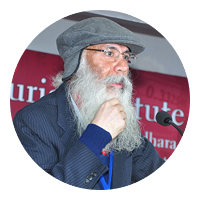
Prof. Arun Kumar
Centre for Economic Studies and Planning, JNU
KEYNOTE ADDRESS
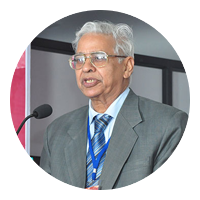
Mr. B K Chaturvedi
Member, Planning Commission, Govt. Of India


